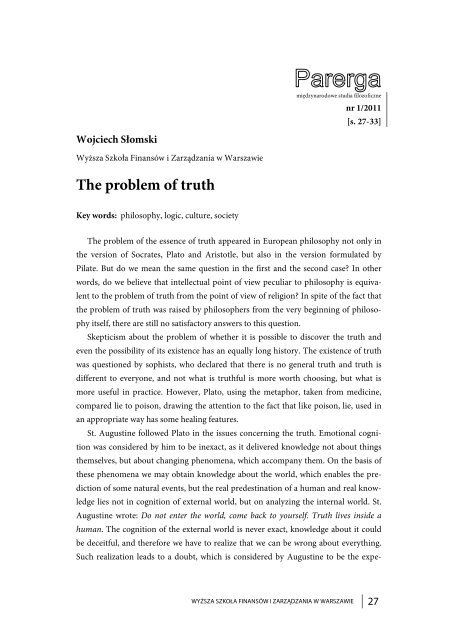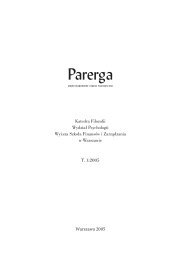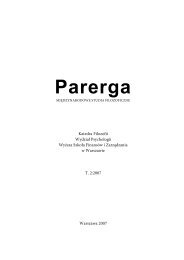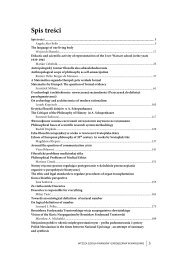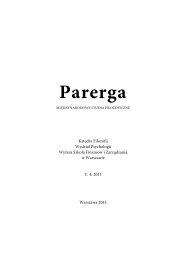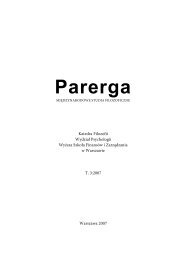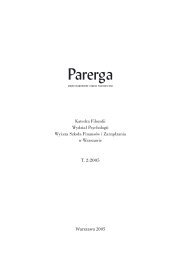pobierz - Parerga - Wyższa Szkoła Finansów i Zarządzania
pobierz - Parerga - Wyższa Szkoła Finansów i Zarządzania
pobierz - Parerga - Wyższa Szkoła Finansów i Zarządzania
Create successful ePaper yourself
Turn your PDF publications into a flip-book with our unique Google optimized e-Paper software.
Wojciech Słomski<br />
<strong>Wyższa</strong> <strong>Szkoła</strong> <strong>Finansów</strong> i <strong>Zarządzania</strong> w Warszawie<br />
The problem of truth<br />
Key words: philosophy, logic, culture, society<br />
międzynarodowe studia filozoficzne<br />
nr 1/2011<br />
[s. 27-33]<br />
The problem of the essence of truth appeared in European philosophy not only in<br />
the version of Socrates, Plato and Aristotle, but also in the version formulated by<br />
Pilate. But do we mean the same question in the first and the second case? In other<br />
words, do we believe that intellectual point of view peculiar to philosophy is equiva-<br />
lent to the problem of truth from the point of view of religion? In spite of the fact that<br />
the problem of truth was raised by philosophers from the very beginning of philoso-<br />
phy itself, there are still no satisfactory answers to this question.<br />
Skepticism about the problem of whether it is possible to discover the truth and<br />
even the possibility of its existence has an equally long history. The existence of truth<br />
was questioned by sophists, who declared that there is no general truth and truth is<br />
different to everyone, and not what is truthful is more worth choosing, but what is<br />
more useful in practice. However, Plato, using the metaphor, taken from medicine,<br />
compared lie to poison, drawing the attention to the fact that like poison, lie, used in<br />
an appropriate way has some healing features.<br />
St. Augustine followed Plato in the issues concerning the truth. Emotional cogni-<br />
tion was considered by him to be inexact, as it delivered knowledge not about things<br />
themselves, but about changing phenomena, which accompany them. On the basis of<br />
these phenomena we may obtain knowledge about the world, which enables the pre-<br />
diction of some natural events, but the real predestination of a human and real know-<br />
ledge lies not in cognition of external world, but on analyzing the internal world. St.<br />
Augustine wrote: Do not enter the world, come back to yourself. Truth lives inside a<br />
human. The cognition of the external world is never exact, knowledge about it could<br />
be deceitful, and therefore we have to realize that we can be wrong about everything.<br />
Such realization leads to a doubt, which is considered by Augustine to be the expe-<br />
WYŻSZA SZKOŁA FINANSÓW I ZARZĄDZANIA W WARSZAWIE 27


